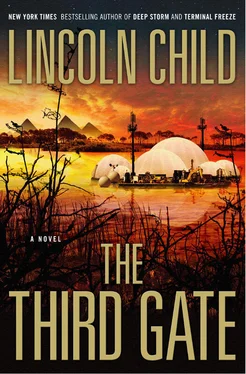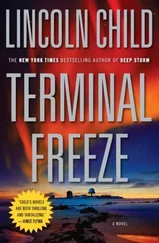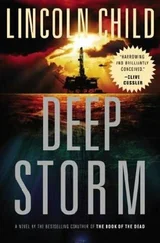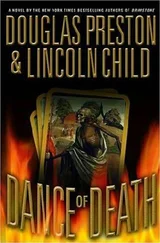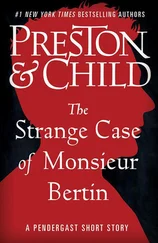Lincoln Child - The Third Gate
Здесь есть возможность читать онлайн «Lincoln Child - The Third Gate» весь текст электронной книги совершенно бесплатно (целиком полную версию без сокращений). В некоторых случаях можно слушать аудио, скачать через торрент в формате fb2 и присутствует краткое содержание. Жанр: Триллер, на английском языке. Описание произведения, (предисловие) а так же отзывы посетителей доступны на портале библиотеки ЛибКат.
- Название:The Third Gate
- Автор:
- Жанр:
- Год:неизвестен
- ISBN:нет данных
- Рейтинг книги:3 / 5. Голосов: 1
-
Избранное:Добавить в избранное
- Отзывы:
-
Ваша оценка:
- 60
- 1
- 2
- 3
- 4
- 5
The Third Gate: краткое содержание, описание и аннотация
Предлагаем к чтению аннотацию, описание, краткое содержание или предисловие (зависит от того, что написал сам автор книги «The Third Gate»). Если вы не нашли необходимую информацию о книге — напишите в комментариях, мы постараемся отыскать её.
The Third Gate — читать онлайн бесплатно полную книгу (весь текст) целиком
Ниже представлен текст книги, разбитый по страницам. Система сохранения места последней прочитанной страницы, позволяет с удобством читать онлайн бесплатно книгу «The Third Gate», без необходимости каждый раз заново искать на чём Вы остановились. Поставьте закладку, и сможете в любой момент перейти на страницу, на которой закончили чтение.
Интервал:
Закладка:
“Except that it doesn’t end. Because in 1941-after years of sedentary retirement-Petrie abruptly left Jerusalem, bound for Cairo. He told none of his old colleagues at the British School of Archaeology about this new expedition of his-and there can be no doubt that it was an expedition. He took a bare minimum of staff: two or three at most, and those I suspect only because of his age and growing infirmity. He made no request for grants; it would appear he sold several of his most prized artifacts to finance the trip. None of these things were in character for Petrie-but strangest of all was his haste. He had always been known for careful, deliberate scholarship. But this trip to Egypt, with North Africa already deep in the throes of war, was the polar opposite of deliberation. It seems to have been frantic-almost desperate.”
Stone paused to take a sip from the tiny cup of coffee. The air was briefly perfumed with the scent of qahwa sada.
“Where exactly Petrie went-why he went-was not known. What was known is that he returned to Jerusalem five months later, alone, funds depleted. He would not speak of where he’d been. His air of desperation remained, yet the journey had sorely weakened an already enfeebled body. He died not long afterward in Jerusalem, in 1942, apparently while raising funds for yet another return to Egypt.”
Stone replaced the cup on its earthenware coaster, then glanced at Logan.
“None of that is in the historical record,” Logan said. “How did you find this out?”
“How do I find anything out, Dr. Logan?” Stone spread his hands. “I peer into the dark corners others don’t bother to examine. I search public and private records, hunting for that one lost document accidentally shoved behind the others and forgotten. I read anything and everything I can get my hands on-including, I might add, obscure graduate dissertations.”
Logan put one hand to his heart, made a mock bow.
“People talk about the secret of my Midas touch.” Stone uttered these last words contemptuously. “What tripe. There’s no secret beyond plain hard work. The fortune I made from the Spanish Plate Fleet gave me the resources to do things my way: send scholars and investigators to all corners of the world, searching quietly for that tantalizing gap in the historical record, that scrap of ancient rumor, that might prove to be of interest-and, perhaps, more than just of interest.”
As quickly as it came, the bitterness left Stone’s voice. “In the case of Flinders Petrie, I obtained a battered diary, purchased as part of a lot in an Alexandrian bazaar. The diary had been kept by a research assistant of Petrie’s during his last years in Jerusalem: a young man who wasn’t asked to go along on that final expedition and afterward, in vexation, joined the army. He died in the Battle of the Kasserine Pass. Of course the story described in his diary piqued my interest. What could have possessed Petrie-who cared little for treasure, who had earned a large measure of scholarly fame, not to mention every right to enjoy an old age of ease-to leave the comfort of his home and enter a war zone at almost ninety years of age? It was a mystery.” Stone paused. “But you must understand, Dr. Logan: I have a hundred, two hundred, such mysteries in the vault of my research lab in Kent. Some I discovered myself; others I have paid well to have unearthed. They are all interesting. But my time is finite. I will not commit to a project until I feel confident I have sufficient knowledge to guarantee success.”
The Midas touch, Logan thought. Aloud, he said, “I take it, then, this research assistant of Petrie’s wasn’t the last word on the subject?”
Stone smiled again faintly, and, as he returned Logan’s gaze, the stark, appraising look returned to his eyes. “Petrie’s housekeeper. One of my associates learned of her existence, traced her whereabouts, and interviewed her shortly before her death, in a hospice for the aged in Haifa. This was six years ago. She was rambling, semi-lucid. But under gentle questioning, she clearly recalled one particular afternoon in 1941, when Petrie was displaying a portion of his vast collection of antiquities to a guest. It was a guest of no importance, and Petrie entertained in this fashion frequently. In any case, on this particular occasion the housekeeper clearly recalled Petrie and the nameless guest exploring the contents of a wooden crate from one of the Egyptologist’s earliest excursions up the Nile. All of a sudden Petrie sat bolt upright, as if galvanized by an electric shock. He stammered for a minute. Then he quickly got rid of his visitor with some excuse. And then he closed and locked the door to his study-something he had never done before. That’s what made the housekeeper remember the incident. Within days, he departed on his final trip to Egypt.”
“He found something,” Logan said, “in his storehouse of artifacts.”
Stone nodded. “Something that had been lying there, in plain sight, all along. Or more likely, never carefully examined before the day that guest arrived-Petrie had amassed such a large collection that he barely knew its extent.”
“And I’m assuming-since we’re here-that you found that artifact.”
“I found it,” Stone said slowly.
“May I ask how?”
“You may not.” If this was meant as a joke, it didn’t show. “My methods are, shall we say, proprietary? Suffice to say it was a long, arduous, vexing, boring-and expensive-task. If you assumed I spent a lot of money to discover the journal and the housekeeper-and I did-I spent twenty times as much to learn what it was Petrie uncovered on that day in 1941. But I am willing to share the artifact with you-briefly.” And Stone reached for the cup of coffee, raised it to his lips.
Logan waited, expecting Stone to produce some carefully sealed relic case, or perhaps instruct Dr. Rush to retrieve an artifact from some secret corner of the dusty room. But instead, Stone simply took a sip from the tiny cup. Then he nodded at the worn coaster on the table, now stained with a faint damp ring of coffee.
“Pick it up,” he said.
5
For a moment, Logan hesitated. He wasn’t sure he understood. Stone merely returned his gaze, cup in hand, his expression unreadable.
Logan began to reach for the worn coaster, paused, then extended his hand-gingerly-and picked it up. As he did so he realized it was not earthenware, after all, but a thin piece of limestone, badly chipped at the edges. Turning it over, he saw faint pictographs drawn in pale brown ink.
“Not the original, of course,” Stone said. “But an exact copy.” He paused. “Do you know what it is?”
Logan turned it over in his hands. “It looks like an ostracon.”
“Bravo!” Stone turned toward Rush. “Ethan, this man impresses me more by the minute.” He looked back at Logan. “If you know it’s an ostracon, then you’ll also know its purpose.”
“Ostraca were discarded bits of leftover stone, pottery, almost anything, used for unimportant writings. Antiquity’s version of the notepad.”
“Precisely. With emphasis on ‘unimportant.’ They might have been used for bills of sale or for grocery lists. Which is precisely why I was using that as a coaster. A melodramatic touch, but it makes a point. To someone like Flinders Petrie, ostraca were a dime a dozen: occasionally interesting in the light they could throw on humdrum, everyday life in the ancient world, but otherwise of little significance.”
“Which is why Petrie would never have noticed it before.” Logan looked down at the faded limestone inscription. There were a total of four pictographs, badly scratched and faded. “I know very little about hieroglyphs. What makes this so special?”
“I’ll give you the short version. Have you heard of King Narmer?”
Читать дальшеИнтервал:
Закладка:
Похожие книги на «The Third Gate»
Представляем Вашему вниманию похожие книги на «The Third Gate» списком для выбора. Мы отобрали схожую по названию и смыслу литературу в надежде предоставить читателям больше вариантов отыскать новые, интересные, ещё непрочитанные произведения.
Обсуждение, отзывы о книге «The Third Gate» и просто собственные мнения читателей. Оставьте ваши комментарии, напишите, что Вы думаете о произведении, его смысле или главных героях. Укажите что конкретно понравилось, а что нет, и почему Вы так считаете.
